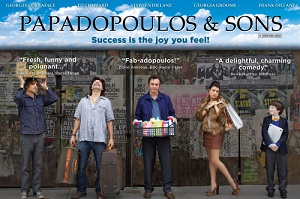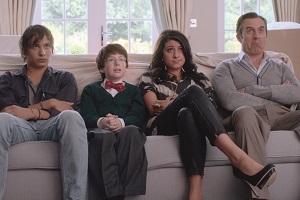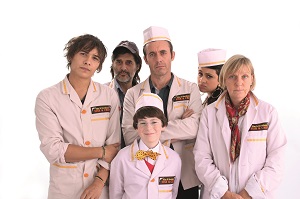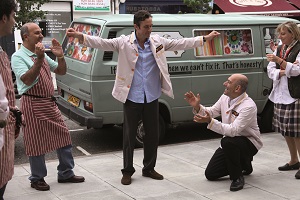 There’s a scene that comes early in Papadopoulos & Sons that shows a small family’s patriarch struggling with the consequences of a devastating financial setback. The man laments how the sudden plunge into poverty and his return to a service job will destroy the confidence his children have in him, which prompts the family’s nanny to reply that, “seeing you behave like a spoiled brat will do that perfectly well.” This is the theme at the heart of Papadopoulos & Sons, a charming little film that tells a familiar story about familial sacrifice and devotion in a very fresh manner.
There’s a scene that comes early in Papadopoulos & Sons that shows a small family’s patriarch struggling with the consequences of a devastating financial setback. The man laments how the sudden plunge into poverty and his return to a service job will destroy the confidence his children have in him, which prompts the family’s nanny to reply that, “seeing you behave like a spoiled brat will do that perfectly well.” This is the theme at the heart of Papadopoulos & Sons, a charming little film that tells a familiar story about familial sacrifice and devotion in a very fresh manner.
The movie follows the tribulations of Harry Papadopoulos (Stephen Dillane, a.k.a. Stannis Baratheon from Game of Thrones), a self-made businessman and entrepreneur who appears to be on top of the world in the picture’s opening minutes. The Greek transplant has done well in England, and has risen from co-owner of a small fish and chips operation to the head of a major food corporation. Although Harry lost his wife some time ago, his prosperous business has led him into the real estate world, which seems to promise even more wealth…that is until the bank that’s funding his development venture implodes.
 In the blink of an eye the Papadopoulos family is practically broke, and is on the verge of being out on the streets when Harry’s attorneys learn that the original fish and chips shop that gave birth to the fallen empire is still technically his. Well, partially, anyway. The establishment is on the books as co-owned by Harry and his estranged brother, Spiros (Georges Corraface), who arrives once summoned to gleefully bury the hatchet. The two brothers had parted on bad terms decades ago after Harry went off to make his millions, leaving the old shop boarded up and forgotten until the events of the film: where it is again opened and put into operation.
In the blink of an eye the Papadopoulos family is practically broke, and is on the verge of being out on the streets when Harry’s attorneys learn that the original fish and chips shop that gave birth to the fallen empire is still technically his. Well, partially, anyway. The establishment is on the books as co-owned by Harry and his estranged brother, Spiros (Georges Corraface), who arrives once summoned to gleefully bury the hatchet. The two brothers had parted on bad terms decades ago after Harry went off to make his millions, leaving the old shop boarded up and forgotten until the events of the film: where it is again opened and put into operation.
Although the set-up for Papadopoulos & Sons presents a seemingly predictable trajectory, what with the family bonding, etc., etc., the path it takes to get to the desired destination is hardly expected. For example, although the movie makes a point to demonstrate how detached Harry is from the lives of his children early on, it’s also careful to show how deeply he cares for them, and the mother they lost. This never comes in wistful monologues or tearful outbursts, but instead in the pained, silent reactions that wash over Spiros and Harry when the latter brother’s spouse is mentioned.
 Naturally, all of this gets mixed together with the financial troubles of the family, which Harry works desperately to mend whilst buying time in his newly renovated fish and chips shop. The stoic father of three insists that their time working in and living above a fish and chips shop is simply a temporary stop-gap measure, and that they will all get back to their “real” lives soon. Yet Spiros never takes this talk too seriously, and is constantly reminding Harry of all the good times they once had as a couple of young upstarts frying up cod and potatoes.
Naturally, all of this gets mixed together with the financial troubles of the family, which Harry works desperately to mend whilst buying time in his newly renovated fish and chips shop. The stoic father of three insists that their time working in and living above a fish and chips shop is simply a temporary stop-gap measure, and that they will all get back to their “real” lives soon. Yet Spiros never takes this talk too seriously, and is constantly reminding Harry of all the good times they once had as a couple of young upstarts frying up cod and potatoes.
Again, it’s all terribly familiar, and visible from a mile away, yet the way it comes off in Papadopoulos & Sons makes it surprisingly irresistible. The infectious optimism of Spiros bleeds through the screen, and is the perfect counterpart to Harry’s enduring resilience. As the Papadopoulos clan is forced into a tight, confined living situation, the bonds between each family member only grows stronger, and teaches Harry (and by extension, the audience) a great lesson about what’s most important in life. Indeed, although one may think they have lost everything, if the bonds of one’s family remain intact, no man or woman can think themselves poor.
 There’s also a funny sub-plot about a rival Turkish Kebab establishment across the street from the Papadopoulos fish fry, something that adds a wonderful cultural spark to the film. And while it is somewhat clunky during the transition between the film’s second and third acts, Papadopoulos & Sons is otherwise short on faults, and moves at a fairly breezy pace. Although Harry’s youngest child, the boy-genius, does stretch the bonds of one’s imaginative capacities, the script allows for a fairly believable portrait of the other two children, and the rest of the picture’s characters. This is no doubt buoyed by the fact that Dillane’s real-life son, Frank Dillane, plays that same role in this picture, something that makes for a very realistic dynamic between the two.
There’s also a funny sub-plot about a rival Turkish Kebab establishment across the street from the Papadopoulos fish fry, something that adds a wonderful cultural spark to the film. And while it is somewhat clunky during the transition between the film’s second and third acts, Papadopoulos & Sons is otherwise short on faults, and moves at a fairly breezy pace. Although Harry’s youngest child, the boy-genius, does stretch the bonds of one’s imaginative capacities, the script allows for a fairly believable portrait of the other two children, and the rest of the picture’s characters. This is no doubt buoyed by the fact that Dillane’s real-life son, Frank Dillane, plays that same role in this picture, something that makes for a very realistic dynamic between the two.
Playing at this year’s Seattle International Film Festival, Papadopoulos & Sons is like a supremely built hot fudge Sunday on a sunny day. While there’s nothing especially original or fancy about it, the indulgence still offers an unparalleled treat when thoughtfully assembled and served during an oppressively hot afternoon. And even though there might not be much nourishment there, life isn’t just about making the “right” decisions all the time. Sometimes, every once in a while, the foolish decisions turn out to be the most productive ones. The path toward this realization is the journey Harry takes in Papadopoulos & Sons, and it is a delicious one to watch unfold.





Comments on this entry are closed.